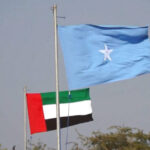In the intricate world of geopolitics, the actions of nations are often influenced by a web of alliances, strategic interests, and covert maneuvers. As the spotlight focuses on Ethiopia and its Prime Minister Abiy Ahmed’s bold moves in Somalia, whispers of external involvement, particularly from the formidable alliance of the UAE and the enigmatic Big Shraks, have begun to circulate.
This revelation may not be as startling as it seems, as various media outlets have hinted at the shadowy connections behind Abiy’s recent geopolitical maneuvers. Notably, Abiy’s reluctance to engage with Asmara, once a vital port city for Ethiopia before Eritrea gained independence, raises eyebrows. Could there be a hidden hand guiding Abiy’s actions, steering the ship of Ethiopian foreign policy towards uncharted waters?
Diving into the depths of this geopolitical puzzle, it becomes apparent that Abiy’s actions may extend beyond his individual decisions. A London-based security officer, employed by a reputable legal firm, claims to have stumbled upon legal documents with the unmistakable imprint of Somaliland. These documents sought protection and legal recognition from the UK government, indicating a longstanding initiative that has quietly unfolded over several years.
In the context of ongoing conflicts in Gaza and Yemen, particularly the strife involving the Houthis, it appears that Abiy and Somaliland may be strategically leveraging these global tumults to advance their respective agendas. The chessboard of geopolitics is complex, and nations often seize opportunities arising from regional disturbances to further their interests.
As we dissect the layers of this geopolitical chess game, it’s plausible that Abiy sees an opening to establish a naval base in Somalia, ensuring the protection of interests supported by those who clandestinely back his actions. The maritime sphere, often overlooked in traditional analyses, plays a pivotal role in the strategic calculus of nations. Abiy’s potential move to secure a naval base could be more than a mere military outpost—it could be a calculated maneuver to safeguard the interests of external forces operating behind the scenes.
The UAE’s historical involvement in the Horn of Africa and its strategic partnership with Big Shraks raise questions about their role in shaping Abiy’s foreign policy. Is Abiy acting as a puppet or a willing partner in a larger geopolitical game orchestrated by these powerful players?
In conclusion, the unfolding events in the Horn of Africa demand a closer examination of the hidden threads weaving through the geopolitical tapestry. Abiy’s actions in Somalia may be the tip of the iceberg, revealing a more intricate and orchestrated strategy involving influential external actors. As the world watches this geopolitical drama unfold, it is imperative to discern the motives and interests that lurk beneath the surface, shaping the destiny of nations in ways not immediately apparent.
Author: Mohamed Muse, Somali federal election commisioner





